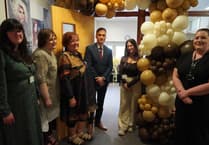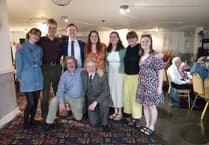Despite the sub-zero temperatures, a good number of people ventured out to Coleg Meirion-Dwyfor on Friday, 1 December, drawn by the rare opportunity to hear locally an early-music recital on lute and theorbo (the bass lute).
Emanuele Addis, a Young Concert Artist for Making Music, did not disappoint.
His first half comprised music for lute, with the main focus on John Dowland whose mostly short pieces enjoy vivid titles such as Mrs Winter’s Jump, Orlando Sleepeth or The Frog Galliard, as well as other galliards honouring important patrons such as The Most Sacred Queen Elizabeth or The Most High and Mighty Christianus the Fourth, King of Denmark, Dowland’s employer for eight years.
The galliard was a vigorous dance involving leaps, jumps and hops – Elizabeth was reported as dancing ‘six or seven’ of a morning!
The lute’s delicate timbre drew listeners in, as did Emanuele’s engaging and accomplished presentation.
After several spirited Scottish folk tunes from the 1627 Straloch Lute Book, Emanuele was joined by Dolgellau Music Club chair Ben Ridler for a rendering of the sung version of Dowland’s Can she excuse my wrongs? – a clever song Sting took a fancy to and recorded in his lute phase!
The ‘rightness’ of the lute’s intimate tone for this repertoire was apparent throughout the verses.
After the break the theorbo pretty much stole the show, its richly resounding open bass strings filling the hall’s warm acoustic.
Although now back in fashion as a continuo instrument for baroque accompaniment, the theorbo flourished only in the 17th and early 18th centuries in the hands of little-known names such as Kapsberger and Piccinini whose pieces came over as full of character; so too did those of Robert de Visée (‘Guitar Master’ of Louis XV) and viol virtuoso Marin Marais (transcribed for theorbo by Emanuele).
Kapsberger’s Toccata Arpeggiata gave Emanuele inspiration for an improvised Toccata of his own, a highlight of the evening which breathed fresh life into the tradition and made the instrument seem of the future as well as of the past.
Turning for a final set to his mandolin-like cittern (‘as at home in the tavern as at court’), Emanuele rounded off with Parson’s Well, the King’s March and Bobbing Joe from John Playford’s 1651 The English Dancing Master, an upbeat ending that set the perfect seal on a delightful and distinctive recital.
Dolgellau Music Club would like to give their many thanks to Making Music and the Philip & Dorothy Green Music Trust for their sponsorship.
Are you a member of a group in your community? Do you have news, photos and videos of your latest activities to share? Send them to [email protected]




